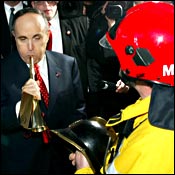| "American Idol" (page 2 of 4) | |||||
Giuliani's longtime aides consider it a sure thing that he will again run for office. What office? "He doesn't talk about that. And he's smart not to," says Bruce Teitelbaum, who managed Giuliani's short-circuited Senate campaign against Hillary Clinton, still runs Giuliani's pac, and is one of the partners in the ex-mayor's new consulting company. Teitelbaum has clearly given extensive thought to how Giuliani plays on a red-and-blue electoral map. Teitelbaum also launches into a passionate monologue about Rudy's underestimated ability to play well with others. What makes the ten-minute jag especially interesting, though, is the statement that provoked it: I said it's impossible to imagine Giuliani being satisfied or fully effective as a vice-president to George W. Bush. "A lot of folks make presumptions about Rudy, and they really don't know him that well," Teitelbaum says. "I think he could probably do any job he set his mind to." Yet conventional calculations aren't what will determine Giuliani's political future. More important is whether his character has actually grown as a result of his trials. At an Elizabeth Dole fund-raiser in Charlotte, North Carolina, in July, a fiftyish, blonde former lobbyist, who has paid $200 to hear Giuliani, alludes to his ennobled stature. "I really wished he'd stayed in the Senate race, because instead we have that Hillary," she says. "But clearly it all worked out for the best, because it was so important he be there to lead after September 11. God had a plan." The grief is never more than an arm's length away. Just the other day, Giuliani was suddenly in the mood for a soda but was short of change. One of his bodyguards rooted around in a pocket looking for some coins. Instead, he pulled out a firefighter's Mass card. Giuliani and his aides went silent. Most of the time, however, the 58-year-old Giuliani is happier and healthier than ever. Surviving prostate cancer and the terrorist attack enlarged his perspective. But in analyzing his current sunny outlook, Giuliani's friends all point to a common influence: Judith Nathan. "He loves her to death," says Bernard Kerik, Giuliani's final police commissioner and now a business partner. Though the couple spends an occasional weekend at Nathan's Southampton condo, she frequently hits the road with Giuliani. Four days in June took him from Chicago to Richmond to Washington to New York. Three days in August brought speeches in Colorado Springs, New Orleans, and Calgary. One night in Washington, Giuliani raised $7.5 million for the GOP's National Congressional Campaign Committee. Giuliani has also been the headline act for the Columbus, Ohio, Speech & Hearing Center; at the Choice Hotels International 48th Annual Convention in Atlanta; at the Society for Human Resource Management 54th Annual Conference and Exposition in Philadelphia; at the 2002 Million Dollar Round Table, a meeting of financial advisers, in Nashville; at the American Road & Transportation Builders Association 100th anniversary gala, in Washington; and at the Snapple convention at Chelsea Piers. He has appeared at the Thomas Jefferson Awards and the MTV Awards. In the past eight months, Giuliani has shared a dais with Scott McNealy, Bill Gates, Mike Krzyzewski, David McCullough, Stephen Ambrose, Willard Scott, Star Jones, the executive vice-president of Ducks Unlimited, and the paraplegic teenage daughter of race-car driver Al Unser. Since September 11, Giuliani has been able to shield his movements behind a claim of security concerns -- and if his complete itinerary were to be made available, he might appear mercenary. Giuliani agreed to appear at a $1,000-a-plate luncheon in Dallas for Republican congressman Pete Sessions only after insisting the campaign do minimal publicity. And though Giuliani usually does a brief pre-event press conference with candidates, his speeches are closed to the media. "The only difference in Rudy," says a longtime observer and adversary, "is that the press and public have fewer avenues in to see what he's doing." The closed door is easily understood in another setting. Roughly once a month, Giuliani welcomes twenty or so relatives of World Trade Center victims to a conference room at Giuliani Partners, inside 5 Times Square. "After he left office, he said he wanted to meet with us to see how we're all doing, to give us advice, to guide us," says Jennie Farrell, who lost a younger brother, James Cartier, and founded the group Give Your Voice. "He comes in and hugs everyone. He's very in tune with the grief that sits at the table. He has his own grief, and he shares that with us. When we first met him, way back when this nightmare started, you could visibly see it, in his face. And you still can." Farrell says Giuliani updates the survivors on his efforts to maximize the memorial space at the Trade Center site and counsels them on where and when to apply their own lobbying. "He has become, for us, a beacon of hope," Farrell says.
| |||||
